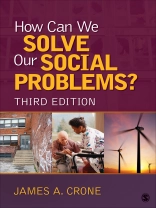‘Rarely do I find a book that so clearly and concisely presents the material is such an accessible engaging manner. I just hope it never goes out of print!’
– Chris Adamski-Mietus,
Western Illinois University
Many of today’s social problems—poverty, crime, racism, sexism, drug abuse, unequal access to quality health care or education, threats to the environment, over-population—can seem intractable. James A. Crone’s
How Can We Solve Our Social Problems?, Third Edition is designed to give students studying these types of social problems a sense of hope. Unlike the standard survey texts that focus heavily on the causes and consequences of problems, this book is devoted to analyzing possible solutions. It maintains a sense of sociological objectivity throughout, and without moralizing, describes what could be done in America and on a global scale, through government policies, private sector initiatives, and the collective actions of citizens, to address even our most pervasive social problems.
Contributor to the
SAGE Teaching Innovations and Professional Development Award
Зміст
Chapter 1: Preparing to Solve Our Social Problems
What Is a Social Problem?
History of Studying Social Problems
Teaching About Social Problems in Today’s World
How Can Sociologists Address Social Problems and Yet Remain Objective?
What Social Problem Should We Solve First?
How Might Sociological Theory Help Us to Solve Social Problems?
A Theory of Conflict and Social Change: A Way to Better Understand and Therefore Solve Our Social Problems
Causal Model: A Picture of Our Theory
My Own Theoretical Orientation
Other Sociological Theories That Can Help Us Understand and Solve Social Problems
Concluding Thoughts on Theory and Social Problems
Addressing Social Problems Within Capitalism
The Next Chapter
Questions for Discussion
Chapter 2: Barriers, Possibilities, and How Sociology Can Help
Barriers to Solving Our Social Problems
Possibilities for Solving Our Social Problems
How Can Sociology Help to Solve Social Problems?
Questions for Discussion
Chapter 3: How Can We Solve the Problem of Increasing Inequality?
Definition and Statistics
Causes of Growing Inequality
Consequences of Growing Inequality
Options We Have With Inequality
What Should We Do?
Questions for Discussion
Chapter 4: How Can We Solve the Problem of Poverty?
Assumptions We Can Make About Solving Poverty
What Can We Do?
Concluding On an Optimistic Note
Questions for Discussion
Chapter 5: How Can We Solve the Problem of Racial/Ethnic Inequality?
Now, and Where to Next?
What Might Racial/Ethnic Equality Mean?
What More Can We Do?
Questions for Discussion
Chapter 6: How Can We Solve the Problem of Gender Inequality?
What Can We Do?
Concluding Thoughts
Questions for Discussion
Chapter 7: How Can We Solve the Problem of Unequal Education?
What Can We Do?
Problems That Prevent Us From Having Excellent Public Schools
Tax Money for Schools
Positive Consequences
What Will Not Work If We Want Excellent Public Education: The Voucher System
Questions for Discussion
Chapter 8: How Can We Solve the Problem of Crime?
What Can We Do?
A Dilemma: Capitalism and Crime
Questions for Discussion
Chapter 9: How Can We Solve the Problem of Drugs?
Keep the Current Policy
Legalize Drugs for Adults
Take a Step-by-Step Approach by Legalizing One Drug at a Time
Where to Go From Here?
Questions for Discussion
Chapter 10: How Can We Solve the Problem of Health Care?
Consequences of Our Problem
Why Don’t We Have a Health Care System That Covers All Citizens Like All Other Industrial Nations?
Criteria for a Health Care System For All Americans
How We Could Implement These Criteria
Advantages of Health Care For All Americans
Disadvantages of Health Care For All Americans
What Other Countries Include in Their National Health Care Systems
The Future: What Could Happen?
Summer and Fall 2009 and Winter 2010: Finally, Serious Debate
March 21, 2010: Health Care Reform Passes Congress
Questions for Discussion
Chapter 11: How Can We Solve the Problems of Families?
Decreasing Inequality to Help Families
Decreasing Poverty to Help Families
Creating Enough Jobs and Enough Decent-Paying Jobs to Help Families
Creating Racial and Ethnic Equality to Help Families
Creating Gender Equality to Help Families
Including Gay and Lesbian Couples to Help Families
Decreasing Crime to Help Families
Changing the Way We Deal With Drugs to Help Families
Creating a National Health Care System to Help Families
Creating Good-Quality Education for All Students to Help Families
Educating Students to Help Families
Educating Parents to Help Families
Summary of What We Can Do to Help Families
Questions for Discussion
Chapter 12: How Can We Solve the World’s Population Problem?
Causes of the World’s Population Problem
What Can We Do?
Where Are We?
Questions for Discussion
Chapter 13: How Can We Solve the World’s Environmental Problem?
Consequences
What Can We Do?
Conclusion
Questions for Discussion
Chapter 14: Solving Our Social Problems: Predictions and Conclusions
A Number of Similar Social Conditions
Defining a Social Condition as a Social Problem
Legitimation
Values and Vested Interests
Loss of Control Over the Social Problem
Attention and Resources
Someone Will Be Dissatisfied
Compromise
Becoming Accustomed to Social Change
Capitalism and Social Problems
Environment, Population, and Standard of Living
Building a Sustainable Society
Conclusion
Questions for Discussion
Про автора
James Crone has been a member of the sociology faculty at Hanover College faculty for over 30 years. In the course of his career, he has taught courses on social problems, social stratification, and social theory. Research in all these areas has contributed to his Pine Forge Press book, How Can We Solve Our Social Problems? During his time at Hanover, Professor Crone has served as Chair of the Department of Sociology and Anthropology, president of the local chapter of Habitat for Humanity, and president of the Hanover Town Council.












